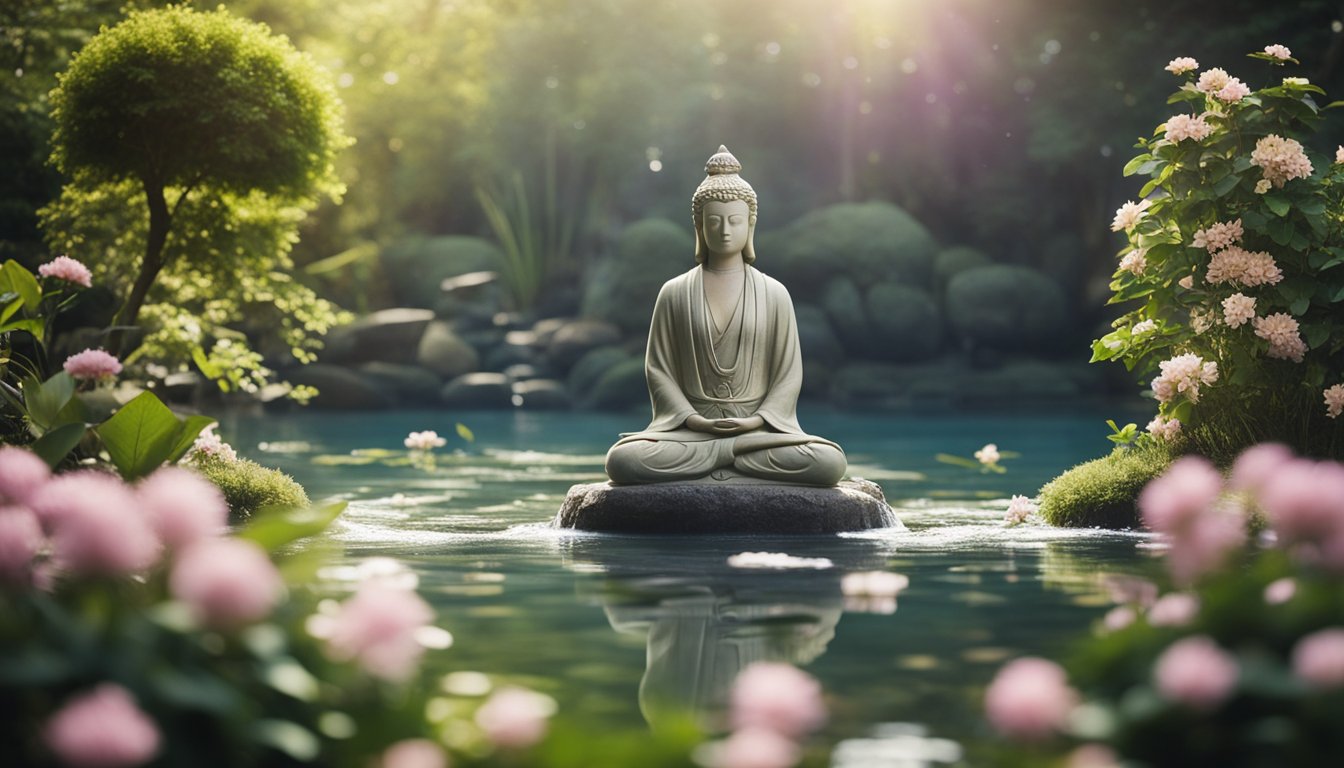Late updated: 10 Feb 2025 10:02
Written by: Ella Thompson
Finding Inner Peace Through Meditation Practices: A Path to Tranquillity
Embarking on a journey of meditation can be a transformative experience for those seeking a respite from life's chaos. Meditation provides a gateway to inner peace by helping us create a deep sense of awareness and presence. This mental practice has been keeping pace with our fast-moving world by offering effective techniques to cultivate calm and clarity amidst everyday challenges.

Through regular meditation practice, we can significantly reduce stress and improve our emotional well-being. Various styles of meditation, from the stillness of Zen to the dynamic movement of walking meditation, offer unique pathways to achieving a balanced mental state. Finding the right technique can foster a deeper sense of contentment and help us develop equanimity in our everyday lives.
As we immerse ourselves in these practices, it's fascinating to see how meditation can act as a bridge between our inner and outer worlds, enhancing our overall well-being. From calming the mind to improving fitness, the benefits are vast and multifaceted, which makes exploring this ancient practice thoroughly rewarding.
Key Takeaways
- Meditation aids in cultivating inner peace.
- Numerous techniques offer unique benefits for mental clarity.
- Regular practice positively impacts overall well-being.
Understanding Meditation and Its Impact on Inner Peace

Meditation serves as a vital tool in achieving inner peace. It helps us reduce stress, improve emotional regulation, and cultivate a profound sense of harmony and acceptance. By examining meditation's core elements, we gain insight into its transformative impact on emotional and mental well-being.
The Essence of Meditation and Mindfulness
At the heart of meditation lies mindfulness, a practice that anchors us to the present moment. This focus on the 'here and now' fosters feelings of tranquility and relaxation. Mindfulness meditation involves exercises that encourage us to observe our thoughts and emotions without judgment, promoting clarity and mental well-being.
When we meditate, we engage deeply with our surroundings and inner world, heightening our awareness. This heightened awareness enhances our emotional health, enabling resilience against life's challenges. Our meditation journey is often filled with personal growth as we find tranquillity within ourselves.
Benefits of Improved Focus and Emotional Regulation
Consistent meditation practice sharpens our focus and concentration. It enables us to navigate daily tasks with greater efficiency and ease. The clarity gained from meditation reduces mental clutter and promotes better decision-making. Emotional regulation, a key component of meditation, allows us to manage stress and reduce anxiety more effectively.
Meditation empowers us to respond rather than react to external stimuli, fostering emotional balance. The practice contributes to sustained emotional well-being, enhancing our quality of life. By maintaining focus through meditation, we develop better relationships and a more stable emotional foundation.
Incorporating Mindfulness Practices into Daily Routines
Incorporating mindfulness into our daily lives is achievable through simple practices like mindful breathing, mindful eating, and walking meditation. These practices help integrate meditation's benefits into our everyday routines. Mindful breathing, for instance, can be practised anywhere, offering immediate stress reduction.
Walking meditation and mindful eating encourage appreciation of our surroundings and nourishment, grounding us in the present. Daily practice embeds mindfulness into our lifestyle, fostering relaxation and overall well-being. By making these practices routine, we reinforce our commitment to living consciously, enhancing our personal growth and harmony with the world around us.
Exploring Diverse Meditation Techniques
Meditation offers a vast array of techniques that cater to both beginners and experienced meditators. By providing tailored practices, these techniques enhance emotional stability, increase self-awareness, and strengthen the mind-body connection.
Guided Practices for Beginners and Seasoned Meditators
For those just starting, guided meditation can ease the journey into mindfulness. This technique involves a guide or instructor, either in person or through audio, leading us with visualisations and prompts.
Guided visualisation is particularly beneficial, as it helps cultivate self-love and emotional resilience by directing focus to tranquil imagery.
For seasoned practitioners, guided practices can deepen spiritual connections and explore higher consciousness. Practices like loving-kindness meditation, also known as metta meditation, foster compassion and non-judgment by encouraging us to send positive thoughts to ourselves and others.
Guided techniques offer versatility for all levels, making them a valuable part of any meditation practice.
Cultivating Tranquility through Specialized Meditations
Specialised meditation techniques such as breathing meditation and mantra meditation are powerful tools. Breathing meditation, including layouts like focused attention meditation, enhances emotional balance and reduces the stress hormone cortisol by concentrating on deep, calming breaths.
Chakra balancing focuses on aligning the body's energy centres, fostering a grounded and content state of mind.
Practices like zazen and Zen meditation promote resting the mind in stillness and understanding beyond the chaos of daily distractions. These specialized forms not only provide techniques for overcoming challenges, but they also ensure the cultivation of inner peace and clarity.
Physical and Mental Rejuvenation Strategies
To aid both physical well-being and mental rejuvenation, we can explore strategies such as yoga nidra and progressive muscle relaxation.
Yoga nidra systematically guides us into deep relaxation, promoting better sleep and enhanced cognitive abilities. This practice encourages restfulness, thereby improving our attention span and creativity.
Body scan meditation is another technique that increases self-awareness and gratitude by systematically bringing attention to different parts of our body. These strategies not only serve as a means of self-care but also support our emotional balance and overall mental health. By integrating these into our routines, we ensure that both mind and body remain at peak vitality.
Frequently Asked Questions

In our exploration of meditation, we address how consistent practice can promote peace of mind and emotional well-being. We also examine the integration of meditation into daily life and the influences of spiritual traditions such as Buddhism.
How can one achieve peace of mind through regular meditation?
Regular meditation helps us focus the mind, which can lead to diminished stress and anxiety. By developing mindfulness, we train our minds to remain present. This presence fosters a sense of inner calm and allows us to face life's challenges with greater ease.
What are effective meditation techniques for attaining inner tranquillity?
Several techniques, such as mindfulness meditation, transcendental meditation, and loving-kindness meditation, can be particularly effective. Each method offers unique approaches to achieve mental calm, whether by focusing on the breath, repeating a mantra, or cultivating compassion.
In what ways does daily meditation practice contribute to emotional well-being?
Daily meditation encourages emotional regulation through increased awareness of our thoughts and feelings. We begin to notice negative patterns and can respond more deliberately. Over time, this practice can lead to improved mood, reduced reactivity, and greater emotional balance.
What role does Buddhism play in fostering inner calmness?
Buddhism provides frameworks like Zen and Vipassana meditation, emphasising mindfulness and insight. By understanding and practising the principles of non-attachment and compassion, we find pathways to inner peace. These teachings guide us towards tranquillity through acceptance and understanding.
Can you suggest ways to incorporate meditation into everyday life for better mental health?
Integrating meditation into our daily routine might include setting aside a few minutes each morning or evening. Simple practices, such as mindful walking or breathing exercises during breaks, can also be effective. Mobile apps and online resources offer guidance for maintaining regular practice.
What are the potential changes in one's life from consistent meditation?
Consistent meditation leads to improved concentration and increased self-awareness. Many report feeling more grounded and less reactive to stressors. These changes can enhance relationships, productivity, and overall mental health, as we become more attuned to our needs and those of others.
